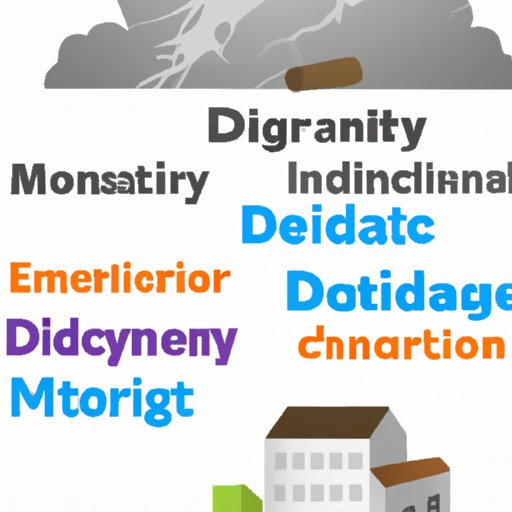Introduction
A natural disaster is defined as an event or consequence of a natural physical process that results in loss of life, damage to property, disruption of normal life and/or environmental degradation. Natural disasters can range from floods and earthquakes to hurricanes and tsunamis. These events often have a devastating impact on communities, leading to changes in social and cultural norms. In this article, we will explore how natural disasters can produce social and cultural change.

Analyzing the Impact of Natural Disasters on Social and Cultural Change
Throughout history, natural disasters have played an important role in shaping societies. According to historian David Christian, “Natural disasters have had a major impact on human societies since the dawn of history, and in some cases have changed the course of history itself.”1 For example, the eruption of Mount Vesuvius in 79 CE led to the destruction of Pompeii and Herculaneum and resulted in major changes in the Roman Empire. Similarly, the Great Lisbon Earthquake of 1755 led to a major shift in European thought and sparked the Age of Enlightenment.
The government response to a natural disaster can also play an important role in shaping social and cultural change. Governments may respond by providing relief funds, establishing shelters, and creating new laws. For example, following the 2008 Sichuan earthquake in China, the government provided aid to survivors and implemented new building codes to ensure that structures were better able to withstand future earthquakes. This response has helped to shape a culture of safety in the region.
Technology also plays an important role in shaping social and cultural change after a natural disaster. Technology allows us to better understand the causes of a disaster, predict its effects, and develop strategies to mitigate its impacts. Advances in communication technology also allow for faster and more efficient responses to disasters. For instance, mobile phones and social media have been used to help coordinate rescue efforts, provide emergency information, and deliver aid to those in need.
Investigating the Relationship Between Natural Disasters and Migration Patterns
Natural disasters can also have a significant effect on economic development and migration patterns. A study by the World Bank found that natural disasters can lead to increased poverty and displacement, particularly in low-income countries.2 This can result in a large number of people migrating from affected areas in search of better opportunities. This can lead to major changes in the social and cultural makeup of a region.
Media coverage of natural disasters can also play an important role in influencing social and cultural change. Media coverage can raise awareness of the issues faced by affected communities and spur the public to take action. For instance, media coverage of the 2004 Indian Ocean tsunami prompted an outpouring of support from around the world, leading to increased donations and aid to affected areas. This type of coverage can help to shape public opinion and mobilize people to take action.
Conclusion
In conclusion, natural disasters can have a profound impact on social and cultural change. Historical events, government responses, technological advances, economic development, and media coverage all play a role in shaping the social and cultural landscape after a disaster. By understanding the relationship between natural disasters and social and cultural change, we can better prepare for and respond to future disasters.
In summary, this article has explored the role of natural disasters in producing social and cultural change. We have looked at the historical connection between natural disasters and social and cultural change, the government response in shaping social and cultural change after a natural disaster, technology’s role in shaping social and cultural change, the effects of natural disasters on economic development, and the role of media coverage in influencing social and cultural change after a natural disaster.
Further research is needed on this topic to gain a better understanding of the long-term effects of natural disasters on social and cultural change. Such research could provide valuable insights into how best to prepare for and respond to future disasters.
(Note: Is this article not meeting your expectations? Do you have knowledge or insights to share? Unlock new opportunities and expand your reach by joining our authors team. Click Registration to join us and share your expertise with our readers.)
